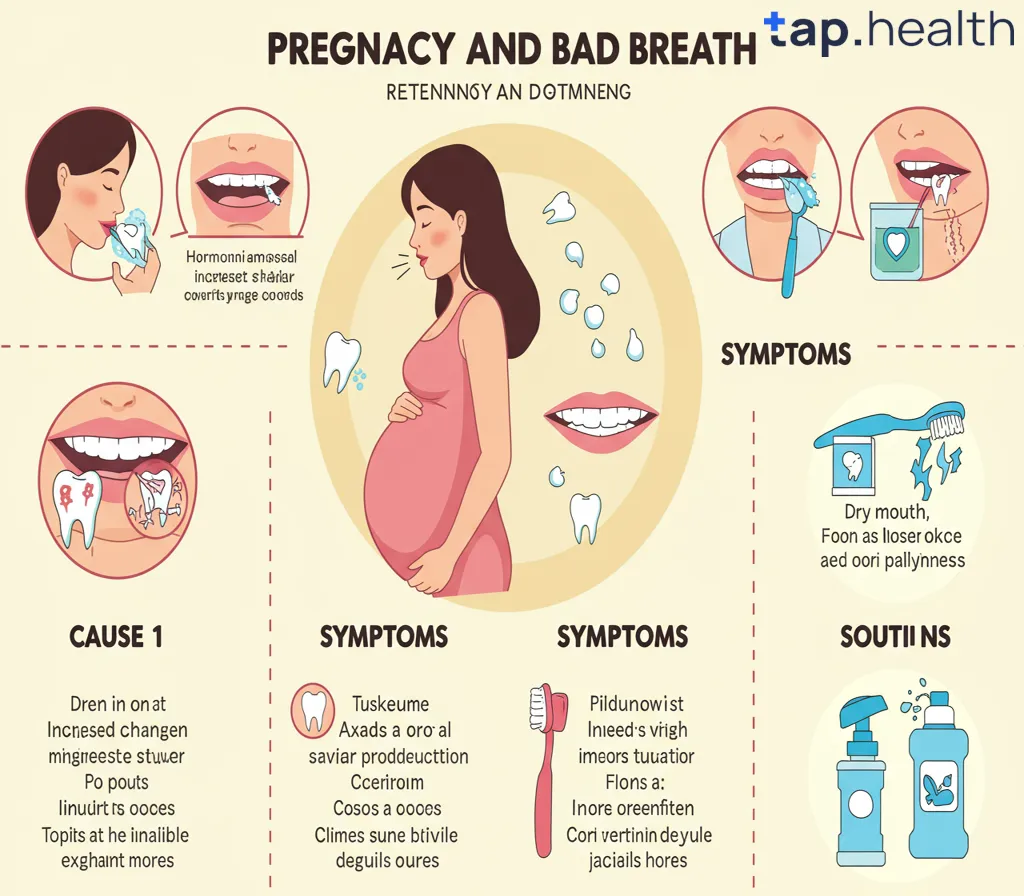Pregnancy is a life-changing experience, and it comes with many physical and hormonal changes. One common but often overlooked symptom is bad breath, or halitosis, which can affect many pregnant women. If you’re expecting and noticing a persistent unpleasant taste or smell in your mouth, you might be wondering, “Does pregnancy cause bad breath?”
The answer is yes—pregnancy can contribute to bad breath, but it’s not just about the pregnancy itself. Several factors, including hormonal shifts, dietary changes, and even the health of your gums, play a role. In this article, we’ll explore why pregnancy can lead to bad breath, the reasons behind it, and most importantly, how to manage and prevent it.
Why Does Pregnancy Cause Bad Breath?
Bad breath during pregnancy is a common issue, and several factors can contribute to it. Let’s break down the main causes:
1. Hormonal Changes
One of the most significant factors contributing to bad breath during pregnancy is the hormonal changes that occur in your body. Specifically, the increase in progesterone levels during pregnancy can cause your digestive system to slow down. This slowing of digestion can lead to an accumulation of bacteria in your mouth, which in turn can cause bad breath. Moreover, these hormones can relax the muscles in the esophagus, leading to acid reflux, which may cause sour or foul-smelling breath.
2. Morning Sickness and Vomiting
Another reason pregnant women experience bad breath is morning sickness, which affects many expectant mothers, especially in the first trimester. Nausea and vomiting can leave an unpleasant taste in the mouth, and the stomach acids that come with vomiting can contribute to bad breath. This is often referred to as acidic breath and can be particularly bothersome.
3. Dry Mouth (Xerostomia)
Dry mouth, or xerostomia, is another condition commonly experienced during pregnancy. It occurs when the body produces less saliva, which plays a crucial role in cleaning the mouth and preventing bacteria buildup. Reduced saliva flow can result from hormonal changes, dehydration, or even nausea and vomiting. Without enough saliva, food particles and bacteria can accumulate in your mouth, causing bad breath.
4. Changes in Diet and Cravings
Pregnancy often comes with food cravings and dietary changes. Some women may crave certain foods that can contribute to bad breath, like garlic, onions, or sugary foods. Additionally, if your diet lacks certain nutrients, such as vitamins and minerals, it can affect your overall oral health and lead to bad breath.
5. Pregnancy Gingivitis and Gum Disease
Pregnancy also increases the risk of gingivitis and gum disease. The hormonal fluctuations in pregnancy can cause the gums to become more sensitive and prone to infection. Swollen, bleeding gums are a sign of gingivitis, which can contribute to bad breath. In fact, studies show that gum disease can worsen bad breath due to the buildup of bacteria in the mouth.
6. Acid Reflux and Heartburn
Many pregnant women experience acid reflux or heartburn, especially in the later stages of pregnancy. This occurs when stomach acid backs up into the esophagus, causing a sour or bitter taste in the mouth, along with bad breath. The condition becomes more common as the pregnancy progresses because the growing uterus puts pressure on the stomach, making it easier for acid to escape into the esophagus.
Can Bad Breath During Pregnancy Be Prevented?
While bad breath during pregnancy is common, it can usually be managed or prevented with a few simple steps. Here are some tips for keeping your breath fresh during pregnancy:
1. Maintain Good Oral Hygiene
Good oral hygiene is crucial during pregnancy. Brush your teeth at least twice a day with a fluoride toothpaste, and don’t forget to floss. You can also brush your tongue, as bacteria can accumulate there, contributing to bad breath. If morning sickness causes frequent vomiting, rinse your mouth with water or a mouthwash that’s gentle on your teeth. Just be sure not to brush your teeth immediately after vomiting, as the acid in your mouth can soften tooth enamel, making it more prone to damage.
2. Stay Hydrated
Drinking plenty of water can help combat dry mouth, which is a common cause of bad breath. Staying hydrated also helps keep your mouth moist and wash away food particles and bacteria. Carrying a water bottle and sipping throughout the day can make a big difference.
3. Avoid Certain Foods
Certain foods, like garlic, onions, and spicy dishes, can contribute to bad breath. If you notice that certain cravings or dietary choices are affecting your breath, try to avoid them or eat them in moderation. Additionally, try to limit sugary foods and drinks, as they can promote the growth of bacteria in your mouth, leading to bad breath.
4. Use Sugar-Free Gum or Mints
Chewing sugar-free gum or sucking on mints can stimulate saliva production and freshen your breath. Look for gums that contain xylitol, which can help fight the bacteria that cause bad breath.
5. Rinse with a Saltwater Solution
If you suffer from pregnancy gingivitis, using a saltwater rinse can help reduce inflammation and improve your oral health. Rinsing with warm saltwater can soothe your gums and reduce bacteria buildup, which may help prevent bad breath.
6. Eat Smaller, More Frequent Meals
Eating smaller, more frequent meals can help manage acid reflux and heartburn, which are common during pregnancy. Smaller meals reduce the amount of pressure on your stomach and help prevent acid from backing up into the esophagus. Avoid lying down immediately after eating to reduce the risk of acid reflux.
7. Visit Your Dentist Regularly
Pregnancy-related changes in your body, including the increased risk of gum disease, make it important to see your dentist regularly during pregnancy. Regular dental checkups can help catch and treat any gum problems before they lead to more serious issues like periodontal disease or severe bad breath.
When Should You See a Doctor for Bad Breath During Pregnancy?
In most cases, bad breath during pregnancy is temporary and can be managed with good oral hygiene and lifestyle adjustments. However, there are some situations where you should seek medical advice:
1. Persistent or Severe Bad Breath
If your bad breath doesn’t improve with home remedies or good oral hygiene, or if it’s accompanied by other symptoms, it’s important to consult with your doctor. Persistent bad breath can sometimes be a sign of an underlying condition such as diabetes, kidney disease, or liver disease.
2. Swollen, Bleeding Gums
If you notice that your gums are bleeding, swollen, or feel tender, it may be a sign of pregnancy gingivitis or gum disease. Both conditions can contribute to bad breath, and a dentist can help treat them before they progress to more severe problems.
3. Severe Heartburn or Acid Reflux
If you experience severe heartburn or acid reflux that doesn’t respond to over-the-counter treatments, talk to your doctor. They may recommend prescription medications or other treatments to help manage your symptoms and reduce the risk of bad breath caused by acid backing up into the esophagus.
How Does Pregnancy Affect Your Mouth and Gums?
Pregnancy can have a noticeable impact on your mouth and gums, and it’s important to take extra care of your oral health during this time. Let’s look at some common oral health changes during pregnancy:
1. Pregnancy Gingivitis
As mentioned, hormonal changes during pregnancy can lead to gingivitis, an early stage of gum disease. Pregnant women are more likely to develop gingivitis due to increased blood flow to the gums and higher hormone levels. Symptoms include swollen gums, bleeding gums, and bad breath.
2. Pregnancy Tumors
Some women may develop pregnancy tumors (also called pyogenic granulomas) on their gums. These are non-cancerous growths that can bleed easily and cause discomfort. While they are usually harmless and go away after delivery, they can contribute to bad breath and gum issues during pregnancy.
3. Tooth Decay
Pregnancy cravings for sugary foods and changes in eating habits can increase the risk of tooth decay. If you don’t maintain good oral hygiene, cavities may develop, leading to bad breath. To prevent this, brush your teeth regularly, floss daily, and see your dentist for routine checkups.
FAQ on Does Pregnancy Cause Bad Breath?
1. Does pregnancy cause bad breath?
Yes, pregnancy can cause bad breath due to hormonal changes, dry mouth, morning sickness, changes in diet, and gum disease. These factors can lead to halitosis or unpleasant breath during pregnancy.
2. How can I prevent bad breath during pregnancy?
To prevent bad breath during pregnancy, maintain good oral hygiene by brushing and flossing regularly, drink plenty of water to stay hydrated, avoid foods that trigger bad breath, and chew sugar-free gum to stimulate saliva production. Regular dental visits can also help.
3. Is bad breath during pregnancy a sign of something serious?
In most cases, bad breath during pregnancy is not a serious issue. However, if it persists, or if you have swollen, bleeding gums or other symptoms, it could be a sign of gum disease or other health issues that require medical attention.
4. Can pregnancy cause dry mouth?
Yes, pregnancy can cause dry mouth, which is known as xerostomia. This can occur due to hormonal changes, dehydration, or medications. Dry mouth can contribute to bad breath, so staying hydrated and maintaining good oral hygiene is important.
5. When should I see a doctor about bad breath during pregnancy?
If you experience persistent bad breath, swollen and bleeding gums, or severe acid reflux, it’s a good idea to consult with your healthcare provider. They can help identify any underlying issues and recommend appropriate treatments.
In conclusion, bad breath during pregnancy is a common issue caused by hormonal changes, morning sickness, dry mouth, and pregnancy-related gum problems. While it can be bothersome, there are several ways to manage and prevent it, such as maintaining good oral hygiene, staying hydrated, and avoiding foods that trigger bad breath. If your symptoms persist or worsen, it’s important to consult with your doctor or dentist for further evaluation. Taking care of your oral health during pregnancy can help ensure you have a fresh and healthy smile throughout this special time.



